【新课标】 Unit 9 I like the music that I can dance to. 整单元知识点解析课件(共58张PPT)
文档属性
| 名称 | 【新课标】 Unit 9 I like the music that I can dance to. 整单元知识点解析课件(共58张PPT) |
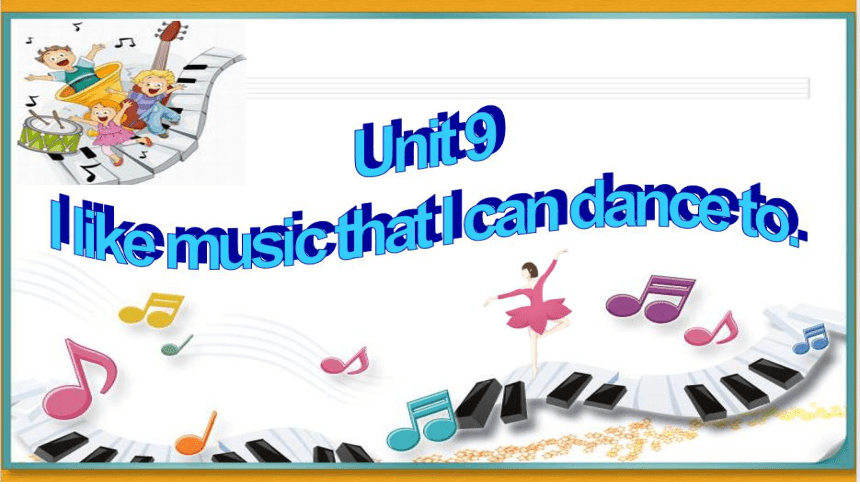
|
|
| 格式 | zip | ||
| 文件大小 | 1.6MB | ||
| 资源类型 | 试卷 | ||
| 版本资源 | 人教新目标(Go for it)版 | ||
| 科目 | 英语 | ||
| 更新时间 | 2022-11-24 00:00:00 | ||
图片预览

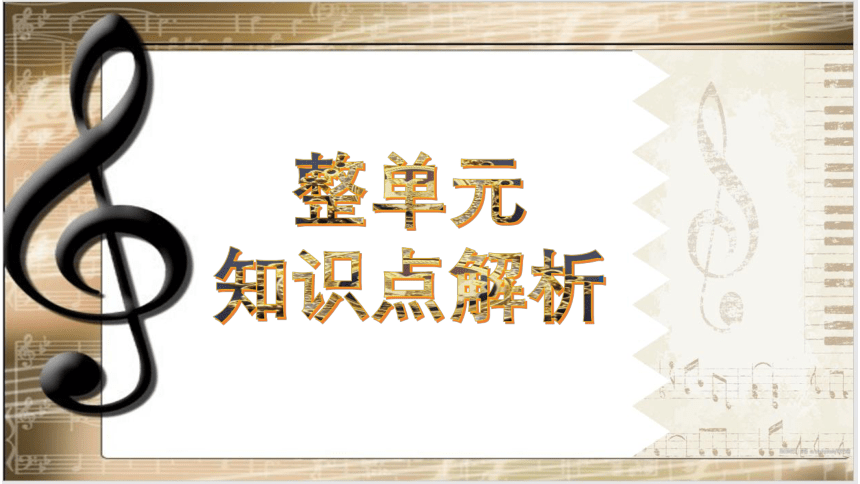
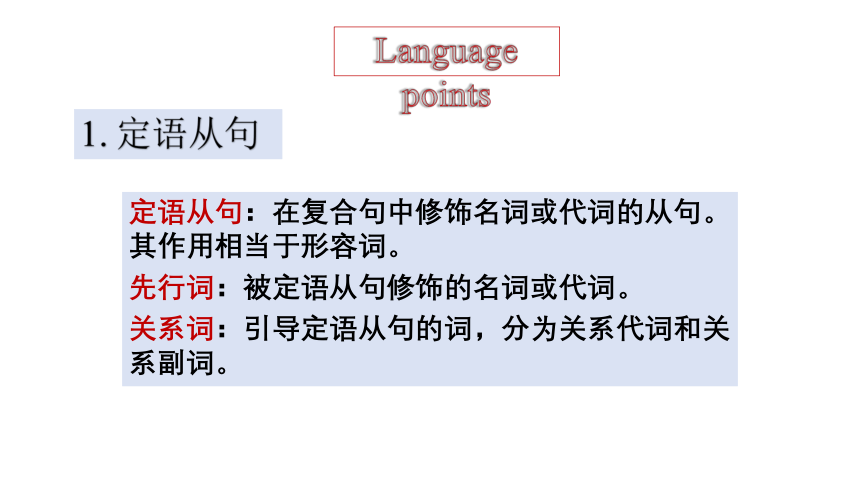
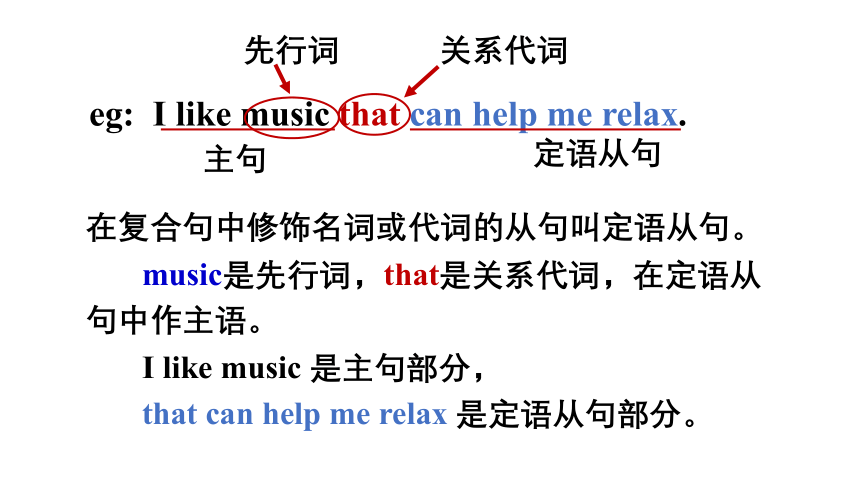
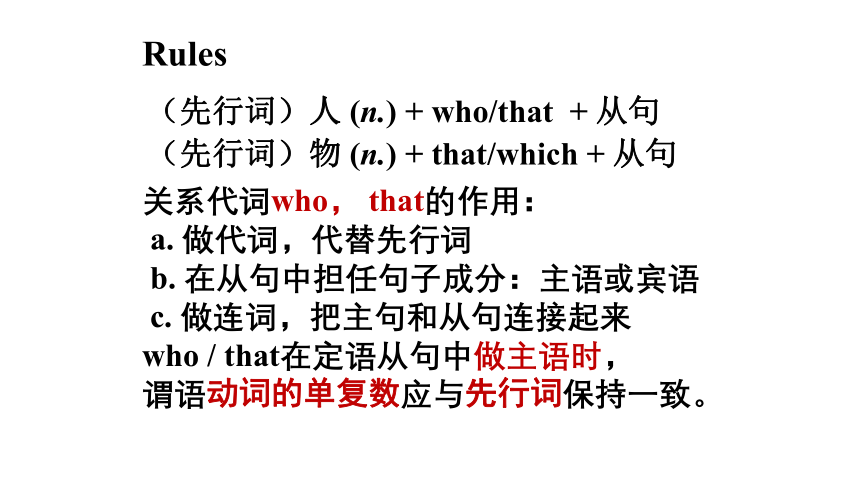
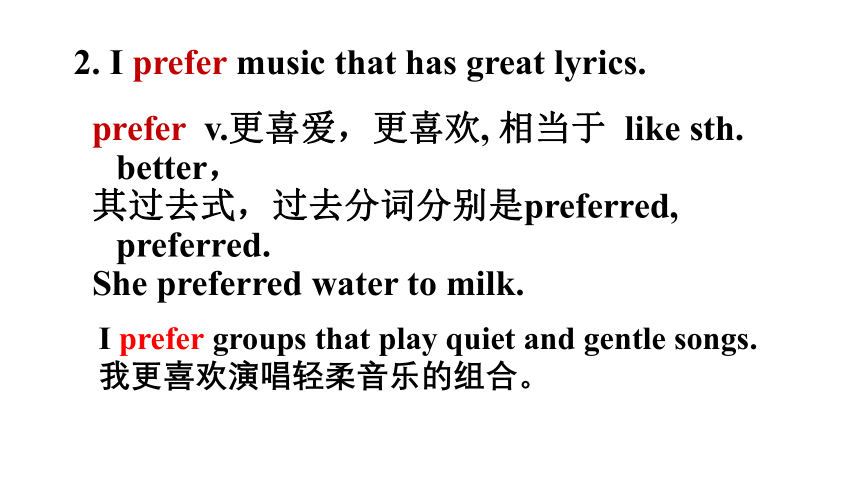
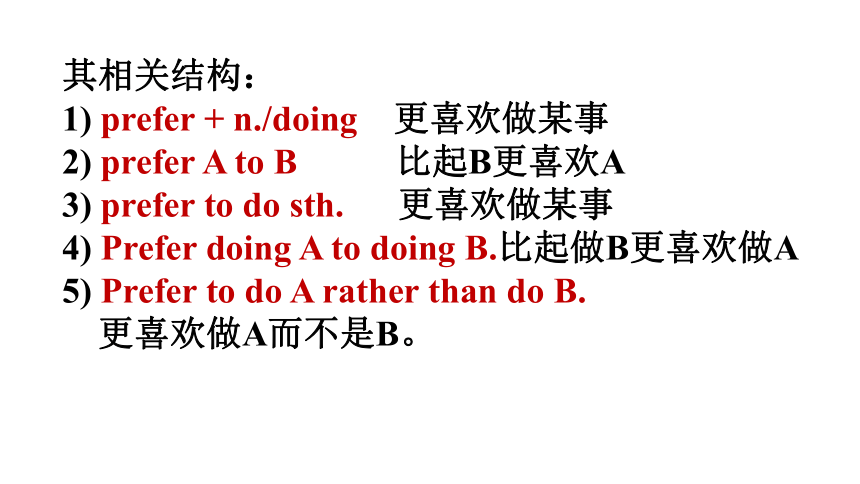
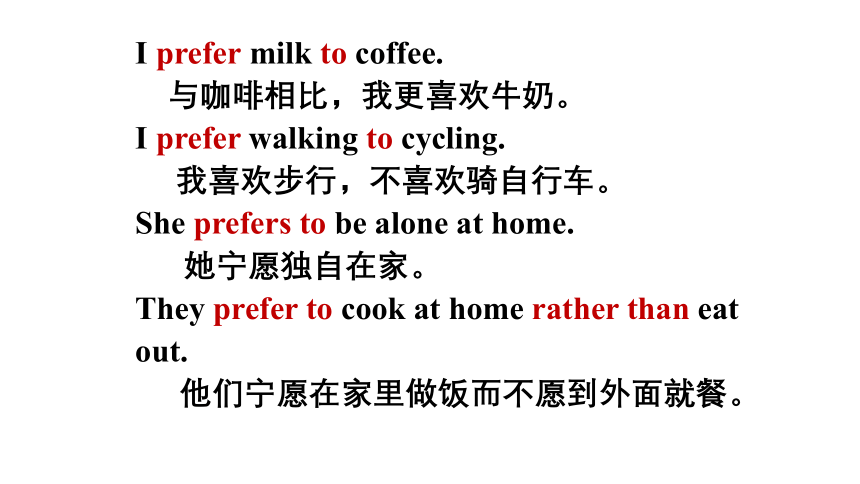
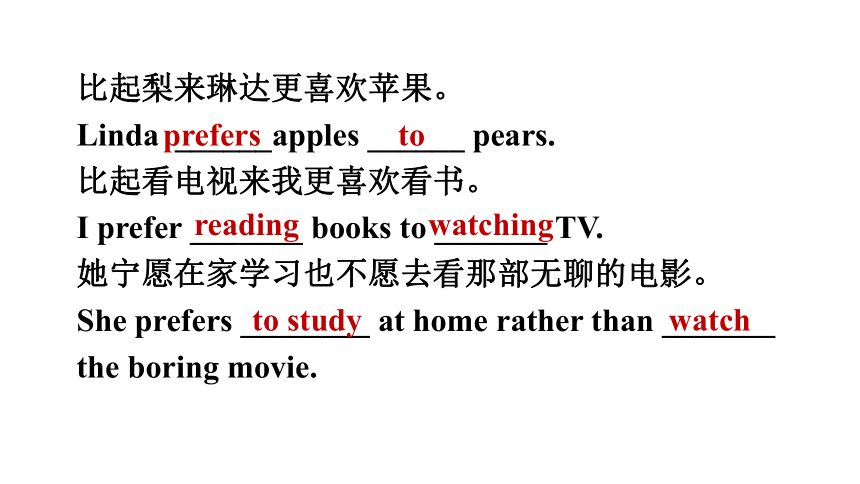
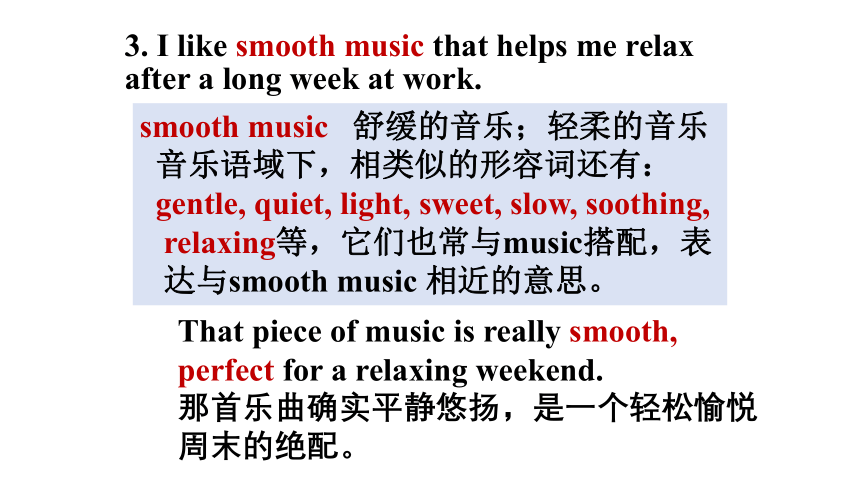
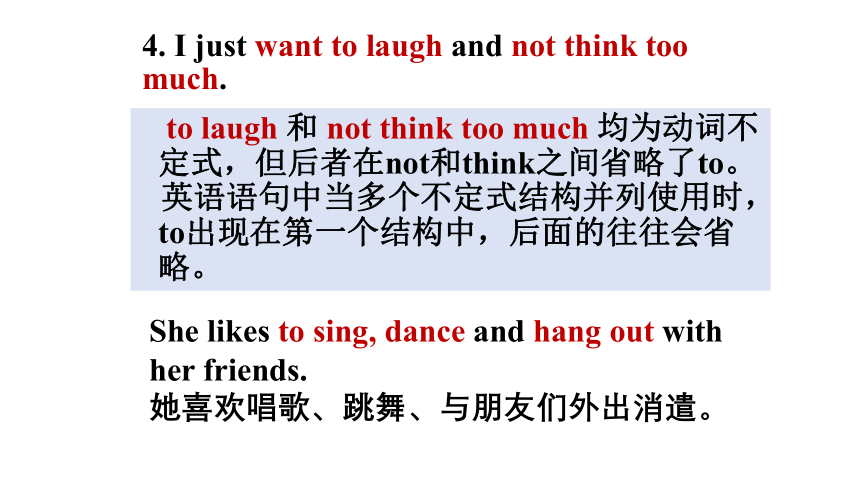
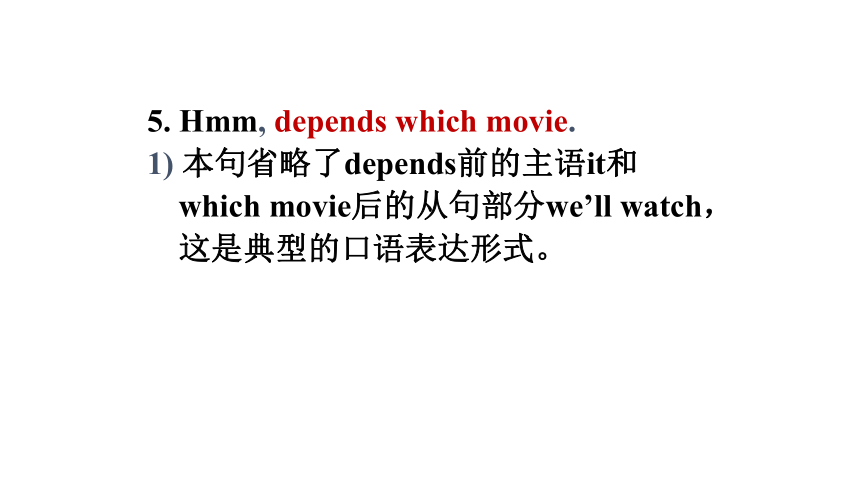
文档简介
(共58张PPT)
整单元
知识点解析
1. 定语从句
定语从句:在复合句中修饰名词或代词的从句。其作用相当于形容词。
先行词:被定语从句修饰的名词或代词。
关系词:引导定语从句的词,分为关系代词和关系副词。
Language points
eg: I like music that can help me relax.
先行词
关系代词
定语从句
主句
在复合句中修饰名词或代词的从句叫定语从句。
music是先行词,that是关系代词,在定语从句中作主语。
I like music 是主句部分,
that can help me relax 是定语从句部分。
关系代词who, that的作用:
a. 做代词,代替先行词
b. 在从句中担任句子成分:主语或宾语
c. 做连词,把主句和从句连接起来
who / that在定语从句中做主语时,
谓语动词的单复数应与先行词保持一致。
(先行词)人 (n.) + who/that + 从句
(先行词)物 (n.) + that/which + 从句
Rules
2. I prefer music that has great lyrics.
prefer v.更喜爱,更喜欢, 相当于 like sth. better,
其过去式,过去分词分别是preferred, preferred.
She preferred water to milk.
I prefer groups that play quiet and gentle songs.
我更喜欢演唱轻柔音乐的组合。
其相关结构:
1) prefer + n./doing 更喜欢做某事
2) prefer A to B 比起B更喜欢A
3) prefer to do sth. 更喜欢做某事
4) Prefer doing A to doing B.比起做B更喜欢做A
5) Prefer to do A rather than do B.
更喜欢做A而不是B。
I prefer milk to coffee.
与咖啡相比,我更喜欢牛奶。
I prefer walking to cycling.
我喜欢步行,不喜欢骑自行车。
She prefers to be alone at home.
她宁愿独自在家。
They prefer to cook at home rather than eat out.
他们宁愿在家里做饭而不愿到外面就餐。
比起梨来琳达更喜欢苹果。
Linda ______apples ______ pears.
比起看电视来我更喜欢看书。
I prefer _______ books to _______ TV.
她宁愿在家学习也不愿去看那部无聊的电影。
She prefers ________ at home rather than _______ the boring movie.
prefers to
reading watching
to study watch
3. I like smooth music that helps me relax after a long week at work.
smooth music 舒缓的音乐;轻柔的音乐
音乐语域下,相类似的形容词还有:
gentle, quiet, light, sweet, slow, soothing, relaxing等,它们也常与music搭配,表达与smooth music 相近的意思。
That piece of music is really smooth, perfect for a relaxing weekend.
那首乐曲确实平静悠扬,是一个轻松愉悦周末的绝配。
4. I just want to laugh and not think too much.
to laugh 和 not think too much 均为动词不定式,但后者在not和think之间省略了to。
英语语句中当多个不定式结构并列使用时,to出现在第一个结构中,后面的往往会省略。
She likes to sing, dance and hang out with her friends.
她喜欢唱歌、跳舞、与朋友们外出消遣。
5. Hmm, depends which movie.
1) 本句省略了depends前的主语it和which movie后的从句部分we’ll watch,这是典型的口语表达形式。
Anything I can do for you
我能为您做些什么吗?(省略句首部分Is there)
Please hand me one of those books. I don’t care which.
请把那些书递给我一本,不管哪本都行。(省略句尾部分you hand me)
2) It depends (on) who/ what/ how/ whether…是一个常见句型。口语中会省介词on,以求简练。例如:
这要看你想做什么。
It depends what you want to do.
这取决于你有多努力。
It depends how hard you work.
6. I suppose I’ll just listen to this new CD I bought.
think 认为
我想他会晚点到。
I suppose he will arrive a bit late.
我想她不会来我的聚会了。
I don’t suppose she will come to my party.
否定前移 :think/ believe/ suppose
主语为第一人称( I / we)
--Do you suppose there will be much homework today
-- Yes, I suppose so.
-- No, I suppose not.
2) be supposed to do = should do
作为一名学生,你应该按时上学。
As a student, you are supposed to go to school on time.
7. Well, if you have spare time, do you want to watch a movie with me
嗯,如果你有空闲时间,你想和我一起去看电影吗?
spare adj. 空闲的;不用的
in one’s spare time = in one’s free time
在某人的空闲时间
e.g. What do you often do in your spare/free time
8. In that case, I’ll ask someone who likes serious movies.
case n.
in that case 如果那样的话
--I have watched that movie.
-- In that case, I will ask someone else to go with me.
in case (that)+ 句子 以防万一
你最好带上伞,以防天会下雨。
You’d better bring your umbrella in case it rains.
1. While some people stick to only one kind of movie, I like to …
* stick to + n. 表示坚持某种决定、理想或观点等;
你应该坚持你的梦想,不管别人说什么。
You should stick to your dream, no matter what others say.
Language points
Our English teacher asks us to stick to
listening to English news.
我们英语老师要求我们坚持听英语新闻。
* stick to + V-ing 表示坚持做某事。
stick v. 插入
不要把你的筷子插入食物中。
Don’t stick your chopsticks into your food.
【语境应用】完成句子。
1) Mary每天坚持走路去学校。
Mary ________________ to school every day.
2) 尽管我父母不同意,但我还是坚持我的观点。
Although my parents disagreed, I still
________________ my opinion.
sticks to walking
stuck to
while 1) conj. 当…的时候
当他们正在跑步的时候,转角处发生了一起事故。
While they were running, an accident happened at the corner.
2) 而…
我喜欢喜剧片而我弟弟喜欢恐怖片。
I like comedies while my brother likes scary movies.
3) n. 一段时间
He stayed here for only a short while.
once in a while 偶尔
2. When I’m down or tired, I prefer movies that can cheer me up.
* down: 系动词+ down
“不高兴,心情不畅,伤心”
He’s been feeling a bit down ever since he got his exam results.
Down adv. 向下
He walked down the road to the river.
他沿着那条路往河边走去。
Put down your hands! 放下你的手!
let sb. down 让某人失望
糟糕的天气总是让我很难过。
Bad weather always makes me down.
cheer (sb.) up (使)振奋起来,(使)高兴起来
cheer sth. up 使……亮丽起来;使……令人耳目一新
cheer sb. on “为(某人)加油”
She was ill so I sent her some flowers to cheer her up.
她病了,所以我送花给她让她开心起来。
A coat of paint and new curtains would really
cheer the kitchen up.
厨房粉刷一遍再换上新窗帘确实会让人耳目一新。
As the runners went by, we cheered them on.
赛跑者经过时,我们为他们呐喊加油。
【语境应用】完成句子。
1) 我们打算为中国运动员加油。
We are going to ________ Chinese players.
2) Jenny现在很难过,我想去安慰一下她。
Jenny is sad now. I want to _________ _________ _________.
3) 振作起来!咱们明天去公园吧。
_________ _________! Let's go to the park tomorrow.
cheer
cheer her up
Cheer up
3. Documentaries like March of the Penguins which provide plenty of information about a certain subject can be interesting,…
像《帝企鹅》这样的纪录片,通常会针对某个特定话题提供丰富的信息……
plenty of 大量;充足
plenty of后既可接不可数名词,也可接可数名词的复数形式。
e.g. Don’t worry! We have plenty of time.
There are plenty of people in the room.
plenty of + n. 作主语时,谓语动词的单复数形式要与名词的数保持一致。
e.g. Plenty of students have joined the club.
Plenty of work hasn’t been done.
plenty of …= a lot of../ lots of…
我认为我们有很多知识要学习。
I think we have plenty of / a lot of knowledge to learn.
【语境应用】翻译句子。
1) 许多孩子在公园里做游戏。
2) Emily午餐吃了大量的苹果。
3) 看!冰箱里有充足的牛奶。
4) 这个城市需要大量的水。
Plenty of children are playing games in the park.
Emily ate plenty of apples for lunch.
Look! There is plenty of milk in the fridge.
Plenty of water is needed in this city.
4. I can just shut off my brain, sit back and enjoy watching an exciting superhero…
* shut off: 意为“关闭;停止运转”,相当于turn off,其中的off为副词。和代词连用时,要把代词放在该短语的中间。
She walked quickly in and shut off the door behind her.
shut off 关掉(机器等)
你能关掉那台收音机吗?
Could you please shut off the radio
shut v. ( shut—shut) 关闭
Shut the door. It’s cold.
Shut up! 闭嘴!
5. Once in a while, I like to watch movies that are scary. 偶尔,我喜欢看一下恐怖片。
Once in a while 偶尔。 相当于 通常occasionally.
Once in a while, We will take a long walk to the foot of the big mountain.
偶尔,我们会做长距离散步,走到那座大山的脚下。
6. But I am too scared to watch them alone. 但是我太害怕了不敢一个人单独去看。
too… to… 太… 而不能…
The milk is too sweet for the old people to drink. 这牛奶太甜了,不太适合那些老年人喝。
too… to … 可以转换为 so … that… 或者 not enough to do …
The milk is so sweet that the old people can’t drink it.
alone 单独, 区别于 lonely, 孤独
The old man lives alone in a small temple on the top of the mountain, but he says he never feels lonely.
那个老人独自居住在山顶上的小庙里,但他说他从不感到孤独。
Language points
intelligent adj. 聪颖的,有才智的。比较正式。其名词形式是 intelligence.
The scientist are very intelligent.
那个科学家很睿智。
Language points
1. I like clothes that are unusual. 我喜欢那些不平常的衣服。
unusual adj. 不平常的
usual adj. usually adv.
unusual adj. unusually adv.
as usual 照旧
explain v. 解释,说明
explanation n. 解释,说明
explain sth. to sb.
You can explain the language points to others so that you can remember better.
你可以向他人解释这些语言点,这样你就记得更清楚些。
I like writers that explain things well.
我喜欢那些把事情解释得很清楚的作者。
1. The piece which was played on the erhu especially moved me.
piece: 音乐作品 “一首歌,一支乐曲”
When he was a small boy, he could hum songs and difficult pieces of music.
当他还是个小孩子,就会哼唱歌曲和颇有难度的乐曲。
Language points
move v. 在这里的意思是“感动;打动”
移动;搬动
moved adj. 感动的
moving adj. 让人感动的
The story is so moving that everybody was moved.
这个故事很令人感动,我们大家都被感动了。
2. The music was strangely beautiful, but under the beauty I sensed a strong sadness and pain.
sense v. 感觉到; 意识到
n. 感觉; 意识
sense of humor / responsibility
幽默/责任感
My daughter lost her favorite toy and I
could sense her sadness.
Dogs have a very good sense of hearing.
sense n. 意识,感觉
e.g.人有五种感觉:视觉,听觉,嗅觉,味觉和触觉。
People have five senses, sight, hearing, smell, taste, and touch.
make sense 有道理
你说的话没有道理。
What you said doesn’t make sense.
sadness n. 悲哀
e.g. Don’t give yourself up to sadness, there’s still hope!
ness是个名词后缀,一些形容词后加ness可变成名词,如:
happy—___________ kind—___________
sad adj. 悲伤的,忧愁的
e.g. She sang a sad song.
happiness
kindness
Tom loved his wife so much that he didn’t get over the sadness of losing her last year.
pain 意为 “痛苦;疼痛;苦恼
He has a pain in the knee. 他膝盖酸痛。
注意:
表示人“身体某个部位疼痛”要用have a pain / pains in the +部位...
其中pain是可数名词,表示具体的疼痛部位。
painful adj. 痛苦的;疼痛的;费力的
She had a painful cut on her thumb.
她的拇指上有个很疼的伤口。
No pains, no gains.
3. Later I looked up the history of Erquan Yingyue…
我后来查了二泉映月的历史……
look up 查;查找 “动词+副词”构成的短语后面可以跟名词或代词宾语 后接名词作宾语时,名词可位于up之后,也可位于look和up之间
后接代词作宾语时,代词通常位于look和up之间。
e.g. You can look up a new word in the dictionary.
=You can look a new word up in the dictionary.
If you don’t know the word, you can look it up in the book.
根据汉语意思完成英语句子,每空词数不限。
1) 我经常在词典里查生词。
I often _________________ in the dictionary.
2) 我不认识这个词,你能帮我在网上查查吗?
I don’t know this word. Can you help me ______________ on the Internet
look up new words
look it up
marry sb. 嫁给某人;娶某人
get married to sb.和某人结婚
be married to sb.和某人结婚
4. Even after Abing got married and got a home again, he continued to sing and play in the city streets.
continue v. 继续
continue to do sth. 继续做某事
go on to do
go on doing
go on with sth.
相当于
5. He performed in this way for many years.
他用这种方式表演了许多年。
perform v. 表演;执行
e.g. He performed perfectly on the piano.
performance n. 表演,演出
e.g. The theatre is putting on a performance of the popular musical “Cats”.
performer意为“表演者”
The performer acted the play wonderfully.
6. It is a pity that only six pieces of music in total were recorded for the future world to hear, but his popularity continues to this day.
pity n. 遗憾,怜悯
It is a pity that… 很遗憾……
在该句型中, it是形式主语, 真正的主语是that引导的从句。
It’s a pity that you missed the beginning of the movie.
真遗憾你错过了电影开场。
total n. 总数,合计
in total: (=in all)总共;合计
These books will cost you 100 dollars in total.
这些书共收您100美元。
Country music is growing in popularity.
乡村音乐正逐渐得到更多人的喜爱。
total adj. 总的,全体的
e.g. What is the total population of Japan 日本的总人口为多少
master n. 大师,能手
v. 掌握,精通
那个小女孩精通11国语言。
That little girl masters 11 languages.
7. Today, Abing’s Moon reflected on Second Spring is a piece which all the great erhu masters play and praise.
今天,阿炳的《二泉映月》成为了所有伟大的二胡大师们演奏和赞扬的乐曲。
praise 可作名词,及物动词,意为 “表扬;赞扬”;
praise sb. for sth. “因为某事而表扬某人”
Though he was wrong, his father praised him for telling the truth.
be praised for… 意为“因…而受到表扬” 相当于 speak highly of sb./sth.
He was praised for helping an old man.
他以自己的诚实赢得别人的赞扬。He won praises for his honesty.
他值得我们一切的赞美。 He deserves all the praise.
praise v. & n. 表扬;赞扬
praise sb. for sth. 因……表扬某人
win high praise from ... 得到……的高度赞扬
praise ... as ... 称赞……为……
be full of praise for ... 因……赞不绝口
in praise of 赞扬;赞美
完成句子。
1) 她的最新电影得到了人们的高度赞扬。
Her latest movie has _______ _______ _______ _______ people.
2) 因为队员的表现他表扬了他们。
He ________ his team ______ their performance.
won high praise
from
praised for
recall that/ what/ how/ where…
我想不起来昨天发生了什么。
I can’t recall what happened yesterday.
recall v. 回想起
recall doing 回想起做过某事
你记得你给我打过电话吗?Do you recall calling me
8. Its sad beauty not only paints a picture of Abing’s own life but also makes people recall their deepest wounds from their own sad or painful experiences.
它的凄美不仅描绘出阿炳自己的生活,而且也让人们回想起自身的悲苦体验和最深的伤痛。
not only ... but also ... 不但……而且……
连接两个并列成分,如主语、谓语、宾语、表语、状语等,但所强调的重点是后面的部分。
e.g. Molly not only sings well but also dances beautifully.
He is famous not only in China but also in the whole world.
当not only ... but also ... 连接两个主语时,遵循就近原则,谓语动词与后一个主语在人称和数上保持一致。
e.g. Not only the students but also the teacher is very happy.
完成句子,每空词数不限。
咱们选Mike当班长怎么样?他不仅诚实,而且守信。
Shall we make Mike our monitor He is ___________________________________________.
not only honest but can also keep his word
wound n. 伤口,创伤
他臂上有一处伤。He has a wound in the arm.
wound v. 使(身体)受伤;伤害
在这次袭击中,有两名士兵受伤。
Two soldiers were wounded in the attack.
hurt, wound, injure 的区别
hurt 可以指身体上的伤害,也可以指精神上的伤害
He hurt his arm in the sports meeting.
His words hurt her feelings.
wound 一般指外伤,特别是刀伤、枪伤等,或在战争中、打斗中受伤
It’s lucky that you weren’t wounded in the fight.
injure 一般指在事故中受到伤害,外伤,不用于情感方面的伤害。
Many people got injured in the accident.
整单元
知识点解析
1. 定语从句
定语从句:在复合句中修饰名词或代词的从句。其作用相当于形容词。
先行词:被定语从句修饰的名词或代词。
关系词:引导定语从句的词,分为关系代词和关系副词。
Language points
eg: I like music that can help me relax.
先行词
关系代词
定语从句
主句
在复合句中修饰名词或代词的从句叫定语从句。
music是先行词,that是关系代词,在定语从句中作主语。
I like music 是主句部分,
that can help me relax 是定语从句部分。
关系代词who, that的作用:
a. 做代词,代替先行词
b. 在从句中担任句子成分:主语或宾语
c. 做连词,把主句和从句连接起来
who / that在定语从句中做主语时,
谓语动词的单复数应与先行词保持一致。
(先行词)人 (n.) + who/that + 从句
(先行词)物 (n.) + that/which + 从句
Rules
2. I prefer music that has great lyrics.
prefer v.更喜爱,更喜欢, 相当于 like sth. better,
其过去式,过去分词分别是preferred, preferred.
She preferred water to milk.
I prefer groups that play quiet and gentle songs.
我更喜欢演唱轻柔音乐的组合。
其相关结构:
1) prefer + n./doing 更喜欢做某事
2) prefer A to B 比起B更喜欢A
3) prefer to do sth. 更喜欢做某事
4) Prefer doing A to doing B.比起做B更喜欢做A
5) Prefer to do A rather than do B.
更喜欢做A而不是B。
I prefer milk to coffee.
与咖啡相比,我更喜欢牛奶。
I prefer walking to cycling.
我喜欢步行,不喜欢骑自行车。
She prefers to be alone at home.
她宁愿独自在家。
They prefer to cook at home rather than eat out.
他们宁愿在家里做饭而不愿到外面就餐。
比起梨来琳达更喜欢苹果。
Linda ______apples ______ pears.
比起看电视来我更喜欢看书。
I prefer _______ books to _______ TV.
她宁愿在家学习也不愿去看那部无聊的电影。
She prefers ________ at home rather than _______ the boring movie.
prefers to
reading watching
to study watch
3. I like smooth music that helps me relax after a long week at work.
smooth music 舒缓的音乐;轻柔的音乐
音乐语域下,相类似的形容词还有:
gentle, quiet, light, sweet, slow, soothing, relaxing等,它们也常与music搭配,表达与smooth music 相近的意思。
That piece of music is really smooth, perfect for a relaxing weekend.
那首乐曲确实平静悠扬,是一个轻松愉悦周末的绝配。
4. I just want to laugh and not think too much.
to laugh 和 not think too much 均为动词不定式,但后者在not和think之间省略了to。
英语语句中当多个不定式结构并列使用时,to出现在第一个结构中,后面的往往会省略。
She likes to sing, dance and hang out with her friends.
她喜欢唱歌、跳舞、与朋友们外出消遣。
5. Hmm, depends which movie.
1) 本句省略了depends前的主语it和which movie后的从句部分we’ll watch,这是典型的口语表达形式。
Anything I can do for you
我能为您做些什么吗?(省略句首部分Is there)
Please hand me one of those books. I don’t care which.
请把那些书递给我一本,不管哪本都行。(省略句尾部分you hand me)
2) It depends (on) who/ what/ how/ whether…是一个常见句型。口语中会省介词on,以求简练。例如:
这要看你想做什么。
It depends what you want to do.
这取决于你有多努力。
It depends how hard you work.
6. I suppose I’ll just listen to this new CD I bought.
think 认为
我想他会晚点到。
I suppose he will arrive a bit late.
我想她不会来我的聚会了。
I don’t suppose she will come to my party.
否定前移 :think/ believe/ suppose
主语为第一人称( I / we)
--Do you suppose there will be much homework today
-- Yes, I suppose so.
-- No, I suppose not.
2) be supposed to do = should do
作为一名学生,你应该按时上学。
As a student, you are supposed to go to school on time.
7. Well, if you have spare time, do you want to watch a movie with me
嗯,如果你有空闲时间,你想和我一起去看电影吗?
spare adj. 空闲的;不用的
in one’s spare time = in one’s free time
在某人的空闲时间
e.g. What do you often do in your spare/free time
8. In that case, I’ll ask someone who likes serious movies.
case n.
in that case 如果那样的话
--I have watched that movie.
-- In that case, I will ask someone else to go with me.
in case (that)+ 句子 以防万一
你最好带上伞,以防天会下雨。
You’d better bring your umbrella in case it rains.
1. While some people stick to only one kind of movie, I like to …
* stick to + n. 表示坚持某种决定、理想或观点等;
你应该坚持你的梦想,不管别人说什么。
You should stick to your dream, no matter what others say.
Language points
Our English teacher asks us to stick to
listening to English news.
我们英语老师要求我们坚持听英语新闻。
* stick to + V-ing 表示坚持做某事。
stick v. 插入
不要把你的筷子插入食物中。
Don’t stick your chopsticks into your food.
【语境应用】完成句子。
1) Mary每天坚持走路去学校。
Mary ________________ to school every day.
2) 尽管我父母不同意,但我还是坚持我的观点。
Although my parents disagreed, I still
________________ my opinion.
sticks to walking
stuck to
while 1) conj. 当…的时候
当他们正在跑步的时候,转角处发生了一起事故。
While they were running, an accident happened at the corner.
2) 而…
我喜欢喜剧片而我弟弟喜欢恐怖片。
I like comedies while my brother likes scary movies.
3) n. 一段时间
He stayed here for only a short while.
once in a while 偶尔
2. When I’m down or tired, I prefer movies that can cheer me up.
* down: 系动词+ down
“不高兴,心情不畅,伤心”
He’s been feeling a bit down ever since he got his exam results.
Down adv. 向下
He walked down the road to the river.
他沿着那条路往河边走去。
Put down your hands! 放下你的手!
let sb. down 让某人失望
糟糕的天气总是让我很难过。
Bad weather always makes me down.
cheer (sb.) up (使)振奋起来,(使)高兴起来
cheer sth. up 使……亮丽起来;使……令人耳目一新
cheer sb. on “为(某人)加油”
She was ill so I sent her some flowers to cheer her up.
她病了,所以我送花给她让她开心起来。
A coat of paint and new curtains would really
cheer the kitchen up.
厨房粉刷一遍再换上新窗帘确实会让人耳目一新。
As the runners went by, we cheered them on.
赛跑者经过时,我们为他们呐喊加油。
【语境应用】完成句子。
1) 我们打算为中国运动员加油。
We are going to ________ Chinese players.
2) Jenny现在很难过,我想去安慰一下她。
Jenny is sad now. I want to _________ _________ _________.
3) 振作起来!咱们明天去公园吧。
_________ _________! Let's go to the park tomorrow.
cheer
cheer her up
Cheer up
3. Documentaries like March of the Penguins which provide plenty of information about a certain subject can be interesting,…
像《帝企鹅》这样的纪录片,通常会针对某个特定话题提供丰富的信息……
plenty of 大量;充足
plenty of后既可接不可数名词,也可接可数名词的复数形式。
e.g. Don’t worry! We have plenty of time.
There are plenty of people in the room.
plenty of + n. 作主语时,谓语动词的单复数形式要与名词的数保持一致。
e.g. Plenty of students have joined the club.
Plenty of work hasn’t been done.
plenty of …= a lot of../ lots of…
我认为我们有很多知识要学习。
I think we have plenty of / a lot of knowledge to learn.
【语境应用】翻译句子。
1) 许多孩子在公园里做游戏。
2) Emily午餐吃了大量的苹果。
3) 看!冰箱里有充足的牛奶。
4) 这个城市需要大量的水。
Plenty of children are playing games in the park.
Emily ate plenty of apples for lunch.
Look! There is plenty of milk in the fridge.
Plenty of water is needed in this city.
4. I can just shut off my brain, sit back and enjoy watching an exciting superhero…
* shut off: 意为“关闭;停止运转”,相当于turn off,其中的off为副词。和代词连用时,要把代词放在该短语的中间。
She walked quickly in and shut off the door behind her.
shut off 关掉(机器等)
你能关掉那台收音机吗?
Could you please shut off the radio
shut v. ( shut—shut) 关闭
Shut the door. It’s cold.
Shut up! 闭嘴!
5. Once in a while, I like to watch movies that are scary. 偶尔,我喜欢看一下恐怖片。
Once in a while 偶尔。 相当于 通常occasionally.
Once in a while, We will take a long walk to the foot of the big mountain.
偶尔,我们会做长距离散步,走到那座大山的脚下。
6. But I am too scared to watch them alone. 但是我太害怕了不敢一个人单独去看。
too… to… 太… 而不能…
The milk is too sweet for the old people to drink. 这牛奶太甜了,不太适合那些老年人喝。
too… to … 可以转换为 so … that… 或者 not enough to do …
The milk is so sweet that the old people can’t drink it.
alone 单独, 区别于 lonely, 孤独
The old man lives alone in a small temple on the top of the mountain, but he says he never feels lonely.
那个老人独自居住在山顶上的小庙里,但他说他从不感到孤独。
Language points
intelligent adj. 聪颖的,有才智的。比较正式。其名词形式是 intelligence.
The scientist are very intelligent.
那个科学家很睿智。
Language points
1. I like clothes that are unusual. 我喜欢那些不平常的衣服。
unusual adj. 不平常的
usual adj. usually adv.
unusual adj. unusually adv.
as usual 照旧
explain v. 解释,说明
explanation n. 解释,说明
explain sth. to sb.
You can explain the language points to others so that you can remember better.
你可以向他人解释这些语言点,这样你就记得更清楚些。
I like writers that explain things well.
我喜欢那些把事情解释得很清楚的作者。
1. The piece which was played on the erhu especially moved me.
piece: 音乐作品 “一首歌,一支乐曲”
When he was a small boy, he could hum songs and difficult pieces of music.
当他还是个小孩子,就会哼唱歌曲和颇有难度的乐曲。
Language points
move v. 在这里的意思是“感动;打动”
移动;搬动
moved adj. 感动的
moving adj. 让人感动的
The story is so moving that everybody was moved.
这个故事很令人感动,我们大家都被感动了。
2. The music was strangely beautiful, but under the beauty I sensed a strong sadness and pain.
sense v. 感觉到; 意识到
n. 感觉; 意识
sense of humor / responsibility
幽默/责任感
My daughter lost her favorite toy and I
could sense her sadness.
Dogs have a very good sense of hearing.
sense n. 意识,感觉
e.g.人有五种感觉:视觉,听觉,嗅觉,味觉和触觉。
People have five senses, sight, hearing, smell, taste, and touch.
make sense 有道理
你说的话没有道理。
What you said doesn’t make sense.
sadness n. 悲哀
e.g. Don’t give yourself up to sadness, there’s still hope!
ness是个名词后缀,一些形容词后加ness可变成名词,如:
happy—___________ kind—___________
sad adj. 悲伤的,忧愁的
e.g. She sang a sad song.
happiness
kindness
Tom loved his wife so much that he didn’t get over the sadness of losing her last year.
pain 意为 “痛苦;疼痛;苦恼
He has a pain in the knee. 他膝盖酸痛。
注意:
表示人“身体某个部位疼痛”要用have a pain / pains in the +部位...
其中pain是可数名词,表示具体的疼痛部位。
painful adj. 痛苦的;疼痛的;费力的
She had a painful cut on her thumb.
她的拇指上有个很疼的伤口。
No pains, no gains.
3. Later I looked up the history of Erquan Yingyue…
我后来查了二泉映月的历史……
look up 查;查找 “动词+副词”构成的短语后面可以跟名词或代词宾语 后接名词作宾语时,名词可位于up之后,也可位于look和up之间
后接代词作宾语时,代词通常位于look和up之间。
e.g. You can look up a new word in the dictionary.
=You can look a new word up in the dictionary.
If you don’t know the word, you can look it up in the book.
根据汉语意思完成英语句子,每空词数不限。
1) 我经常在词典里查生词。
I often _________________ in the dictionary.
2) 我不认识这个词,你能帮我在网上查查吗?
I don’t know this word. Can you help me ______________ on the Internet
look up new words
look it up
marry sb. 嫁给某人;娶某人
get married to sb.和某人结婚
be married to sb.和某人结婚
4. Even after Abing got married and got a home again, he continued to sing and play in the city streets.
continue v. 继续
continue to do sth. 继续做某事
go on to do
go on doing
go on with sth.
相当于
5. He performed in this way for many years.
他用这种方式表演了许多年。
perform v. 表演;执行
e.g. He performed perfectly on the piano.
performance n. 表演,演出
e.g. The theatre is putting on a performance of the popular musical “Cats”.
performer意为“表演者”
The performer acted the play wonderfully.
6. It is a pity that only six pieces of music in total were recorded for the future world to hear, but his popularity continues to this day.
pity n. 遗憾,怜悯
It is a pity that… 很遗憾……
在该句型中, it是形式主语, 真正的主语是that引导的从句。
It’s a pity that you missed the beginning of the movie.
真遗憾你错过了电影开场。
total n. 总数,合计
in total: (=in all)总共;合计
These books will cost you 100 dollars in total.
这些书共收您100美元。
Country music is growing in popularity.
乡村音乐正逐渐得到更多人的喜爱。
total adj. 总的,全体的
e.g. What is the total population of Japan 日本的总人口为多少
master n. 大师,能手
v. 掌握,精通
那个小女孩精通11国语言。
That little girl masters 11 languages.
7. Today, Abing’s Moon reflected on Second Spring is a piece which all the great erhu masters play and praise.
今天,阿炳的《二泉映月》成为了所有伟大的二胡大师们演奏和赞扬的乐曲。
praise 可作名词,及物动词,意为 “表扬;赞扬”;
praise sb. for sth. “因为某事而表扬某人”
Though he was wrong, his father praised him for telling the truth.
be praised for… 意为“因…而受到表扬” 相当于 speak highly of sb./sth.
He was praised for helping an old man.
他以自己的诚实赢得别人的赞扬。He won praises for his honesty.
他值得我们一切的赞美。 He deserves all the praise.
praise v. & n. 表扬;赞扬
praise sb. for sth. 因……表扬某人
win high praise from ... 得到……的高度赞扬
praise ... as ... 称赞……为……
be full of praise for ... 因……赞不绝口
in praise of 赞扬;赞美
完成句子。
1) 她的最新电影得到了人们的高度赞扬。
Her latest movie has _______ _______ _______ _______ people.
2) 因为队员的表现他表扬了他们。
He ________ his team ______ their performance.
won high praise
from
praised for
recall that/ what/ how/ where…
我想不起来昨天发生了什么。
I can’t recall what happened yesterday.
recall v. 回想起
recall doing 回想起做过某事
你记得你给我打过电话吗?Do you recall calling me
8. Its sad beauty not only paints a picture of Abing’s own life but also makes people recall their deepest wounds from their own sad or painful experiences.
它的凄美不仅描绘出阿炳自己的生活,而且也让人们回想起自身的悲苦体验和最深的伤痛。
not only ... but also ... 不但……而且……
连接两个并列成分,如主语、谓语、宾语、表语、状语等,但所强调的重点是后面的部分。
e.g. Molly not only sings well but also dances beautifully.
He is famous not only in China but also in the whole world.
当not only ... but also ... 连接两个主语时,遵循就近原则,谓语动词与后一个主语在人称和数上保持一致。
e.g. Not only the students but also the teacher is very happy.
完成句子,每空词数不限。
咱们选Mike当班长怎么样?他不仅诚实,而且守信。
Shall we make Mike our monitor He is ___________________________________________.
not only honest but can also keep his word
wound n. 伤口,创伤
他臂上有一处伤。He has a wound in the arm.
wound v. 使(身体)受伤;伤害
在这次袭击中,有两名士兵受伤。
Two soldiers were wounded in the attack.
hurt, wound, injure 的区别
hurt 可以指身体上的伤害,也可以指精神上的伤害
He hurt his arm in the sports meeting.
His words hurt her feelings.
wound 一般指外伤,特别是刀伤、枪伤等,或在战争中、打斗中受伤
It’s lucky that you weren’t wounded in the fight.
injure 一般指在事故中受到伤害,外伤,不用于情感方面的伤害。
Many people got injured in the accident.
同课章节目录
- Unit 1 How can we become good learners.
- Section A
- Section B
- Unit 2 I think that mooncakes are delicious!
- Section A
- Section B
- Unit 3 Could you please tell me where the restroom
- Section A
- Section B
- Unit 4 I used to be afraid of the dark.
- Section A
- Section B
- Unit 5 What are the shirts made of?
- Section A
- Section B
- Review of Units 1-5
- Unit 6 When was it invented?
- Section A
- Section B
- Unit 7 Teenagers should be allowed to choose their
- Section A
- Section B
- Unit 8 It must belong to Carla.
- Section A
- Section B
- Unit 9 I like music that I can dance to.
- Section A
- Section B
- Unit 10 You're supposed to shake hands.
- Section A
- Section B
- Review of Units 6-10
- Unit 11 Sad movies make me cry.
- Section A
- Section B
- Unit 12 Life is full of the unexpected
- Section A
- Section B
- Unit 13 We're trying to save the earth!
- Section A
- Section B
- Unit 14 I remember meeting all of you in Grade 7.
- Section A
- Section B
- Review of Units 11-14
